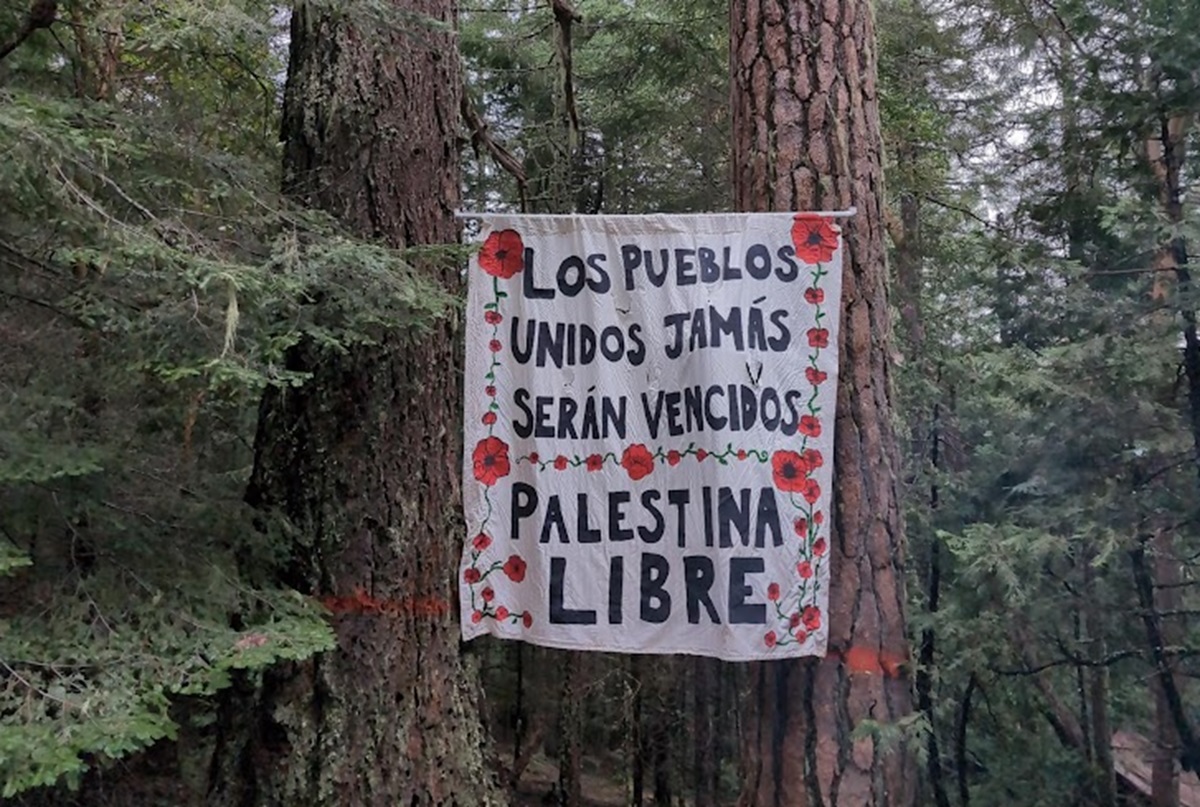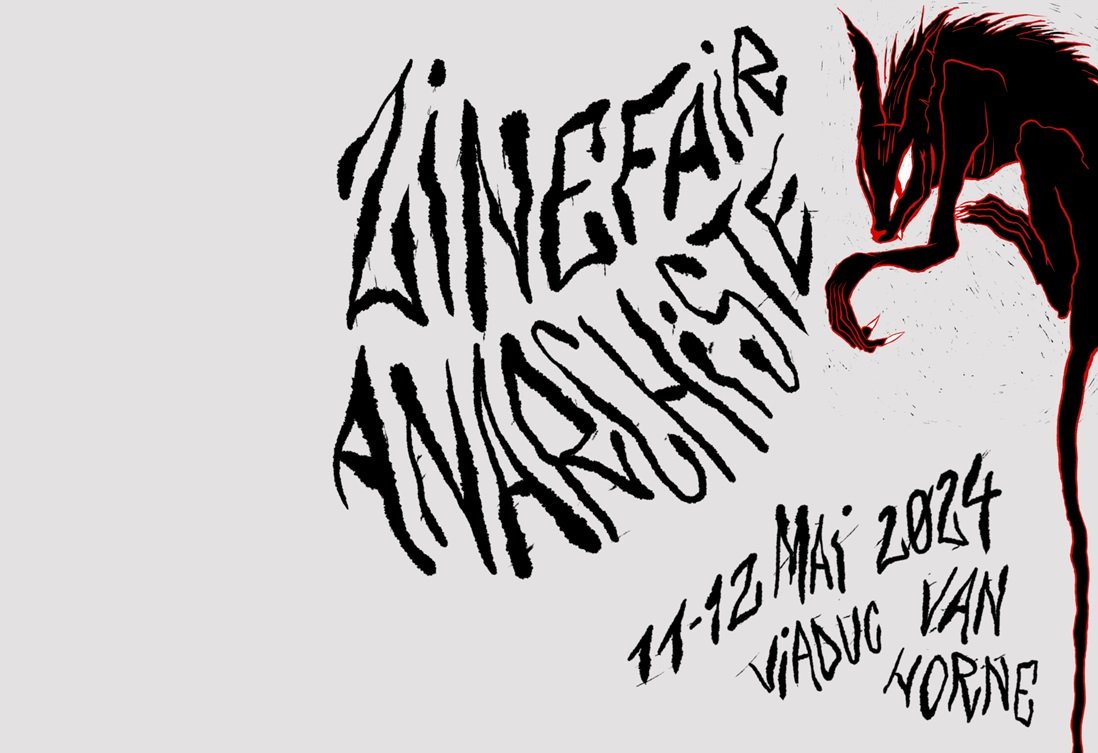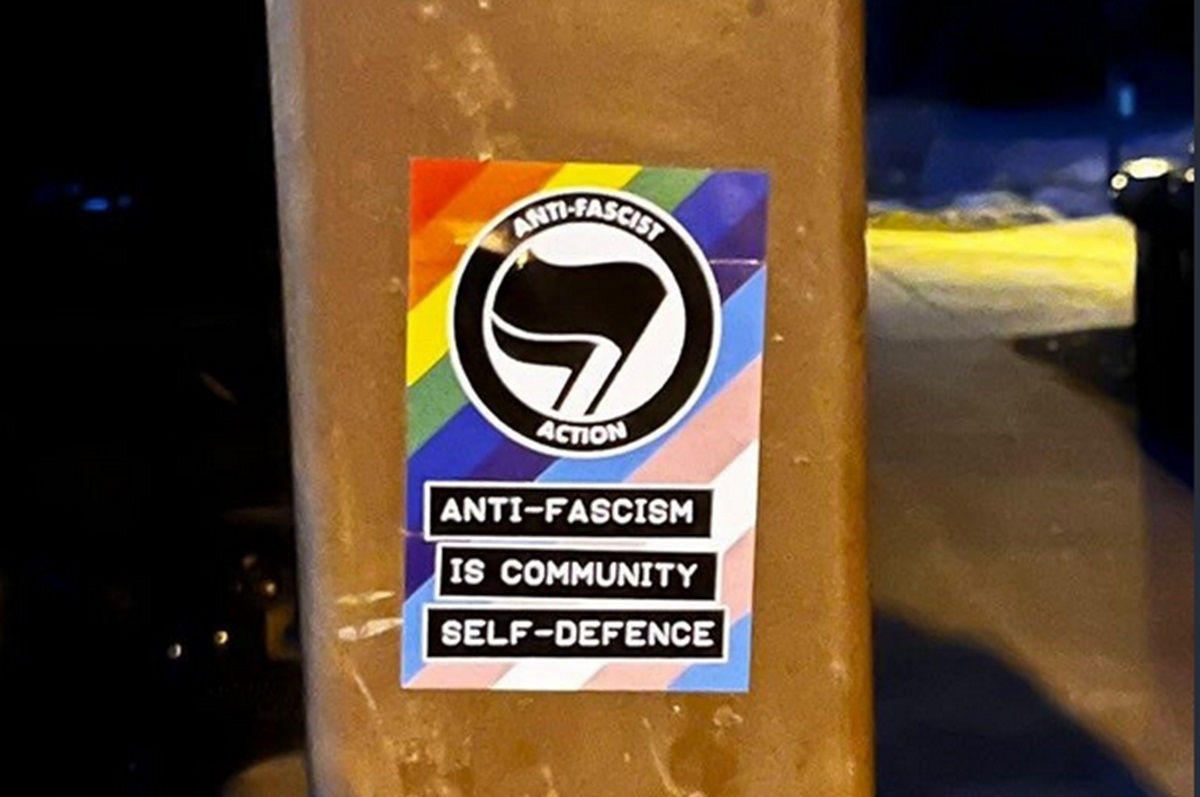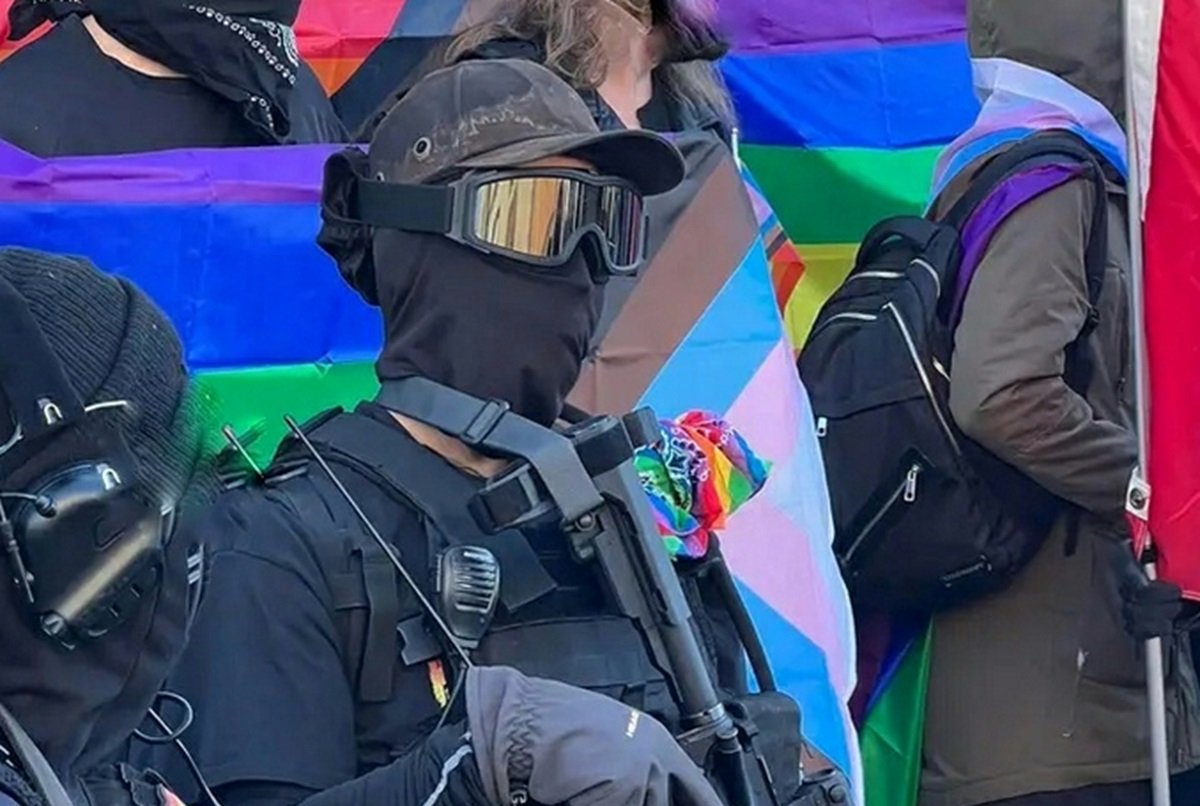Filed under: Indigenous, Interviews, Repression, The State, US
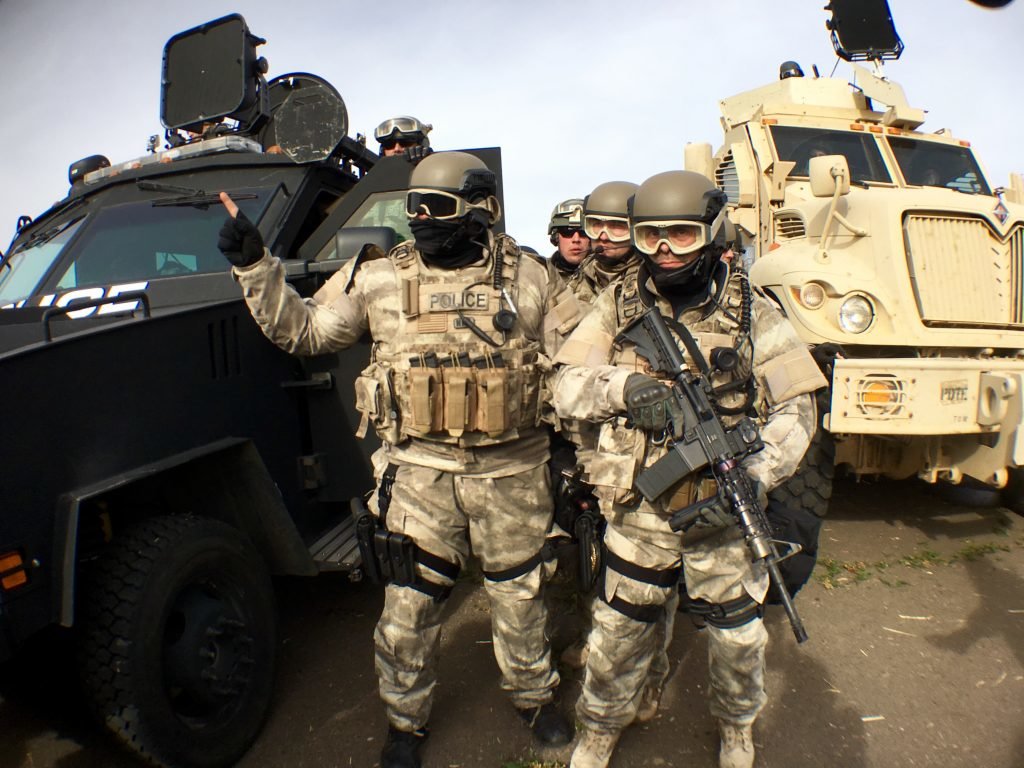
Insurrectionary anarchist publication Anathema interviews two Water Protectors active at Standing Rock about repression and supporting political prisoners.
The persecution and imprisonment of land defenders at Standing Rock continues to this day. This interview provides some background for this struggle and updates about how to support the prisoners.
Anathema: What is Standing Rock and what led to people’s incarceration?
Standing Rock is the Hunkpapa and Yankton Lakota sovereign Nation’s reservation in North Dakota, where Dakota Access Pipeline (DAPL) planned to illegally construct an oil pipeline underneath the Missouri River (Oahe) water supply of the Standing Rock rez, destroying sacred ancestral and burial sites.
The NoDAPL resistance camps began in the spring of 2016 and by summer was in solidarity with over 700 indigenous tribes, and allies. On Oct. 27, 2016, when 1851 Treaty Camp gained increasing numbers of Water Protectors on highway 1806 to block the pathway of the the pipeline, multiple states sent militarized police to illegally raid our camp.
The temporary fires that were built as barricades on HW 1806 and the 134 bridge to stop the influx of police resulted in political imprisonment for five Water Protectors: James ‘Angry Bird’ White, Michael ‘Rattler’ Markus, Michael ‘Little Feather’ Giron, and Dion Ortiz. RedFawn Fallis received charges from the raid due to being targeted by an FBI informant. Only RedFawn and Little Feather were arrested during the raid. Most federal charges were given early winter of 2017.
Anathema: Standing Rock seemed rooted in indigenous networks and land-based struggle; how did that influence people’s approach to struggle and repression?
Rattler: It was something that has been part of my people since before the guy we found lost at sea…Decolonization for me takes place when I learn that my people are not just savages, so when I get back to my roots and learn to protect the people even the ones without a voice, like the 4-legged and winged and many others, I learn that we are all related and try to treat everyone like we are family.
Olive: It’s undeniable to me that this is a continuum of 500+ years of colonization and displacement of sovereign indigenous Nations. The country was founded on literal PRISON CAMPS now called reservations; active resistance to genocide has always resulted in imprisonment and death of indigenous people; ecocide is a facet of genocide, with the “USA” being formed by desecrating ancestral sites and destroying the ecosystem for resource extraction in part to wipe out native Nations.
Now, some indigenous people not only live on reservations (prison camps) but are incarcerated in federal/state prisons for demanding their sovereignty, ceremonies, and ancestral sites, but ANY indigenous person in lock up has ancestral trauma regarding imprisonment that other prisoners do not. Active resistance to the continuum of genocide and state sanctioned violence resulted in political imprisonment of my family, who are all Native people. Corporate impunity has become state sanctioned violence in and of itself, continuing to destroy land and water to further the state’s agenda of resource extraction. It influenced our struggle because we knew ancestors were with us, prayer could be proactive resistance (not mere sentiment), and traditional knowledge of Native Nations knew it was a continuum of resistance to settler colonialism.
Anathema: Can you talk about overlaps between prison abolition, decolonization, and indigenous perspectives on conflict resolution?
Rattler: Conflict resolution is way different to Native people because before we were colonized, if we had a problem we found that it is our honor, not pride, that makes us who we are. I am trying to live my life so that my ancestors will be proud of me…These people (government) have no compassion for other human beings. They like to brag that the justice system has a 98% conviction rate. But what they don’t tell you is that 97% of them convictions are plea bargains. We feel FORCED to take the non-cooperating deal because as in my case I was looking at minimum of 15 years, and the judge already made it clear that he was not going to give any of us Water Protectors a fair trial. I signed my papers under duress, because no one was physically holding a gun to my head, but they were threatening to take away 15 years of my life for exercising my 1st amendment right to peaceful protest. But the government calls people like us that value life over money “terrorists.”
Olive: My family in lock up actively has to endure Bureau of Prison’s (BOP) conditioning of institutionalization, toxic race politics, and ancestral trauma surrounding the criminalization of indigenous people. Even Native ceremonies in prison are treated as a “security risk” by the prisons. The fact Water Protectors are held as political prisoners gives them the chance to help others in lock up see the bigger picture of incarceration attempting to make people pawns, collateral damage, or direct targets of the state.
In many parts of the NoDAPL camps, we worked as Akicita and Ikce Wicasa, adhering as much as we could to traditional Lakota roles/responsibilities so we could have our own accountability process among Water Protectors, while some acted as first responders to support Water Protectors engaging in nonviolent direct action, or as scouts to gather intel against DAPL mercenaries working for the pipeline.
It’s decolonizing by having an alternative to police and colonial law through traditional knowledge such as Akicita. This also meant we had to work in solidarity with other Native people’s traditional knowledge, with several councils before decisions were made, acknowledging we don’t need hierarchy to have structure but have councils and clear commitments/roles through whatever skill sets we had to offer. The fact Little Feather, Rattler, and Angry Bird worked as Akicita and received federal charges is not a coincidence.
Anathema: Spirituality and prayer seemed to play a big role in this struggle — can you tell us about that? Has that been relevant to how people have dealt with their incarceration?
Rattler: When I was at Standing Rock, I ran many inipis (Lakota sweatlodge) for people. It was and is a major part of this revolution. I carried that prayer in here (prison). At camp it was a healing camp, and that healing has never stopped. I brought that healing to the people that need it (in prison). I didn’t leave it out there in the camp.
Olive: The NoDAPL camps had ceremony from countless nations of Native people all day everyday, as well as actively becoming part of strategies involving nonviolent direct action to stop construction of DAPL. We would literally be arrested in camp for engaging in ceremony, while historically Native ceremonies were blatantly outlawed in the “USA” until 1978. As a Sundancer (Wi Wanyang Wacipi), we give flesh offerings for the Land and People.
I always felt nonviolent direct action was another flesh offering, and our prayers at Sundance ceremony along with so many other ceremonies from so many nations of people over the years is partly why the NoDAPL camps ever formed. I feel incarceration is another type of flesh offering, as flesh is being industrialized by the state. But Rattler, who also Sundances, always tells me that “Sundancers make sacrifices for the People; that’s why we’ve been asked to do this. I’m honored to be in prison for what I’ve done.” Even though he’s in lock up, he fasts four days just as we do for Sundance every year, no food or water, and has even had BOP risk retaliation for daring to pray in lock up on his own terms. The point is that true prayer has to be an act of willingness, not sentiment.
Anathema: What were prevailing sentiments at Standing Rock around repression, criminalized actions, and the relation of the struggle to the state? How did tensions play out between different attitudes about these things?
Rattler: Sometimes the tension that happened in the camp was because of not being able to stand up for their right to clean water. When everyone was not doing [actions during winter] that anger that was in them tended to come out towards other people at camp, and it was not good for morale. Like so many of our treaties the money people see nothing but profits for themselves and they pay the government to look the other way as they do what they want. Be building a damn to flood our lands to putting a pipeline in thru our water way. just like the Dakota access pipeline, they didn’t want to put the people of Bismarck and Mandan in harms way. our people have been fighting this kind of oppression since we signed their treaties. and the only ones that break the treaties is the government.
The youth wanted it peaceful and prayerful. there were other societies that honored their desire and held our place in a peaceful way [in camp]. i think that is what scared the feds the most, that we can remain calm in the face of bodily harm. Being a vet myself and a Sundancer, my responsibility is the the people, not to some government hack. Many vets showed up to take us to the drill pad and at the last minute we were pulled away by disagreements in camp. Will veterans stand up again? I don’t know. But if they’re our allies I would hope that they will continue to keep their oath.
Olive: At times it was frustrating, because a prevailing question was “Is property damage violence?” I can never accept it as violence; the violence was the construction of the pipeline that desecrated sacred sites, burial sites, water ways, trafficking from the pipeline workers’ man camps, violent arrests and inhumane jails, enforced by militarized police, armed mercenaries, and federal infiltration. Property damage is so broad, it’s naive to assume it means firebombing or harming people or anything reactionary, but picking and choosing battles for the sake of safety and longevity of the camps made us rely more heavily on nonviolent direct action through lockdowns, soft blockades and occupation of construction sites, which was very successful in many ways.
I honestly believe some people were more prepared to die as a result of stopping pipeline construction than they were to do serious time behind bars, when anyone that protects the needs of Land, Water, and People must realize the inevitable criminalization we must endure to be effective, and they must realize this BEFORE engaging in this kind of struggle so they aren’t in over their heads. Court and prison are their own frontline fight.
Anathema: How can people on the outside support those who are still incarcerated?
We are part of the NoDAPL Federal Prisoner Support Committee made up of imprisoned Water Protectors, our families, and some of our legal aids. Writing letters to defy the state’s attempt of silencing those in lock up and on probation, offering donations for their prison commissary and financial aid under federal surveillance on probation, wearing their shirts or pins to spread awareness, and offering the Support Committee outreach to share our stories of what the state has done to us is all necessary advocacy. The battle against DAPL has continued in prison and court.
Official website: www.nodaplpoliticalprisoners.org
Michael Markus 06280-073
FCI Sandstone Federal Correctional Institution
PO Box 1000 Sandstone, MN 55072
RedFawn Fallis 16358-059
Federal Correctional Institution
5701 8th St. Dublin, CA 94568
James ‘Angry Bird’ White
PO Box 755
Ft. Yates, ND 58538
Little Feather*
Michael Giron
Center Inc.
100 6th Ave. SE
Mandan, ND 58554
Dion Ortiz is currently in a halfway house awaiting transition to probation. His family is waiting to release public mailing info.
*Little Feather is on probation in ND.


